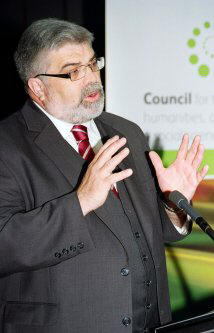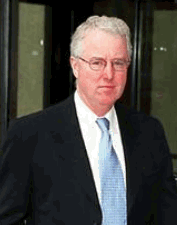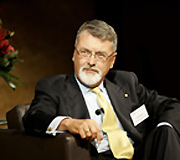|
|
|
|
|
|
|
News & Views item - April 2011 |
![]() Academe, Secretaries of the Department of Prime Minister and Cabinet and Senator
Carr Speak to HASS on the Hill. (April 5, 2011)
Academe, Secretaries of the Department of Prime Minister and Cabinet and Senator
Carr Speak to HASS on the Hill. (April 5, 2011)
 Last
week the Council for the Humanities, Arts and Social Sciences (CHASS) held its
annual event HASS On the Hill conference in Canberra. Three of the speakers at
the conference were the Minister for Innovation, Industry, Science and Research,
Senator Kim Carr, the current secretary of the Department of Prime Minister and
Cabinet (DPMC), Terry Moran, and his immediate predecessor Professor Peter
Shergold. In combining their comments to HASS on the Hill if you don't come away
feeling pangs of panic you're not grasping the gravity of the dysfunctioning of
the government/public service nexus.
Last
week the Council for the Humanities, Arts and Social Sciences (CHASS) held its
annual event HASS On the Hill conference in Canberra. Three of the speakers at
the conference were the Minister for Innovation, Industry, Science and Research,
Senator Kim Carr, the current secretary of the Department of Prime Minister and
Cabinet (DPMC), Terry Moran, and his immediate predecessor Professor Peter
Shergold. In combining their comments to HASS on the Hill if you don't come away
feeling pangs of panic you're not grasping the gravity of the dysfunctioning of
the government/public service nexus.
Senator Carr told HASS on the Hill that the sector should "go on the front foot to argue its importance" in helping meet future social and economic challenges in Australia and added that he rejected the notion that the humanities, arts and social sciences were the "poor relations" of the science and technology sector.
He assured his audience they had "strong advocacy in the highest places in government... The Australian Government is committed to supporting the best quality research in our universities, regardless of the field. Too often in the past, the excellent work of HASS researchers has been overlooked."
Senator Carr then launched into what might be described as a vacuous hand-waving exercise: "We ask you to help us not just interpret the world but to change it. This is the premise on which this Government operates. It is not just enough to understand, we have to make change. We have heavy expectations and we know that a research system that does not take account of HASS research won't meet the challenges of the future... We are performing particularly well across the country in historical studies and in some of our centres and departments we are among the world's best in politics, law, performing arts, cultural studies and philosophy."
And in defence of his Excellence in Research for Australia the Minister claimed that the ERA used objective measures to support an evidence based approach that relied on fact rather than supposition. He said this would help calibrate future priorities for research and inform decisions. Seemingly the use of peer review for the awarding of ARC and NHMRC grants is not of sufficient quality to allow it to continue without the additional layer of retrospective assessment.
_______________________________________________
 At
the beginning of March 2008 Terry Moran took up his position as Secretary of the
Department of Prime Minister and Cabinet being appointed by then Prime Minister
Kevin Rudd. He has been retained in the position by Prime Minister Gillard.
At
the beginning of March 2008 Terry Moran took up his position as Secretary of the
Department of Prime Minister and Cabinet being appointed by then Prime Minister
Kevin Rudd. He has been retained in the position by Prime Minister Gillard.
In addressing HASS on the Hill Mr Moran was forthright in giving his views as to why academe has limited influence on public policy -- it doesn't give bureaucrats what they need therefore policy-makers in government turn to think tanks and consultants for evidence on which to base their policies; academic research is too slow and inaccessible for them to spend their time reading it.
Considering the number of reviews the government sets up which take up thousands of hours of academics' time in both making up the review panels and seeking submissions from them, the question arises on just which planet Mr Moran resides.
None-the-less in Mr Moran's view during his 23 years as a public sector chief executive, he had “long since given up” commissioning academic research to help solve important policy problems. "It’s always late, and it’s always in a form that then has to be further translated before it can be used within government. It’s lost without translation, rather than lost in translation. Policy-makers want to use the best research we can, but it needs to be realistic and digestible. We also need it to be accessible, and frankly, not hidden in journals that policy advisers don’t or can’t access." Apparently Mr Moran would have you believe government departments are not prepared to employ competent research assistants who can understand what they read in peer review journals which are meant to be read by competent fellow researchers not layman.
But that's exactly what consultants and think tanks do.
But there is more to displease Ms Gillard's head of DPMC. Academics don't do research quickly enough: "It’s a waste for an academic to work on a government problem only to find that a solution’s been agreed and implementation is under way by the time the research has been completed and published."
Mr Moran then told HASS on the Hill:
Policy-makers should be reading the best research available to inform evidence-based policy, but that can only happen if reading the work of academics and researchers is a good use of time. The sad truth is that most of the people in government aren’t readily persuaded that reading the conventional results of research – published in the conventional way – is either easy or a good use of their time.
There’s a problem about translation, there’s a problem about relationships,
there’s a problem about timeliness. On my side of the relationship there’s a
willingness to solve those problems, to engage in greater exchanges with
universities. But in my view, universities have been rather introspective.”
Moran predicted governments would increasingly turn to think tanks for “a
much-needed bridge” between the public service desire for “workable solutions”
and the academic aim to improve knowledge.
What think tanks do is sweep up serious policy research, and find ways to apply it in a practical sense to the issues government cares about, in a quiet and timely fashion.
Think tanks can provide an interesting model for universities or academics seeking to have a role in policy development. [They] have carved a small niche for themselves, providing the results of research that can make a big contribution to how governments make decisions ... in a way that is a bit more effective than traditional academic research and discourse.
In all of this there is a hint that it is the bureaucrats who are expected to advise and perhaps who wish to mould their political masters but are not competent to understand the matters on which they are asked to advise.
So back to the consultant - who, for example might be a chief scientific advisor for a department and in turn can consult with particular specialists whom he/she can understand.
But then there is this caveat: "There’s an alternative world to deal with public policy where you can trust people not to make inadvertent comments – because as part of learning their trade, they’re taught the essential requirements of confidentiality – and that is the top-end consulting firms."
After all when can you trust an academic to keep his/her mouth shut, and fingers off the keyboard or not to tweet?
________________________________________________
 But
Peter Shargold, the secretary of DPMC prior to Mr Moran, has his own explanation
for the inaccessibility of academic research -- it's partly a result of
government policy that encourages academics to publish in high-brow journals.
Presumably he is referring to Nature, Science, Physical Review Letters, Cell
and perhaps even PLoS One. And presumably low-brow journals are easier
for bureaucrats to understand.
But
Peter Shargold, the secretary of DPMC prior to Mr Moran, has his own explanation
for the inaccessibility of academic research -- it's partly a result of
government policy that encourages academics to publish in high-brow journals.
Presumably he is referring to Nature, Science, Physical Review Letters, Cell
and perhaps even PLoS One. And presumably low-brow journals are easier
for bureaucrats to understand.
Professor Shargold opined: "Government, through its funding decisions, could encourage a wider role for universities. Academic careers and university funding are to a very large extent based on a very narrow view of the role of universities. It’s difficult for me to find academics to work in the area of – for example – not-for-profit management, because it doesn’t have the A* journals that are necessary." So much for the ERA's journal rankings.
And finally he reinforced Mr Moran's view (as well as Sir Humphrey Appleby's) of the necessity for secrecy: "Any head of DPMC is a bit nervous about confidentiality, especially when it means outsiders have to be involved in the dark arts and mysteries of how cabinet submissions are prepared and carried through. There is a nervousness that by participating in this way, you can almost become co-opted – that your ability to step outside and criticise is lost. And of course it is – you’re making a decision that you can be more influential inside."
What is so worrying through all of this is the element of Yes Minister / Yes Prime Minister on the one hand and echoes of Senator J.S. Phogbound on the other.